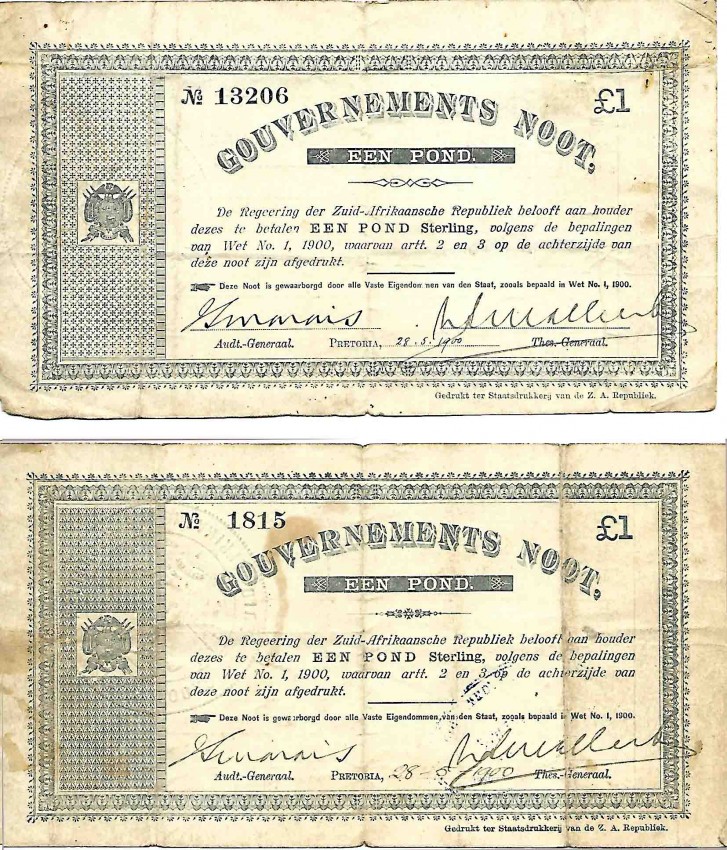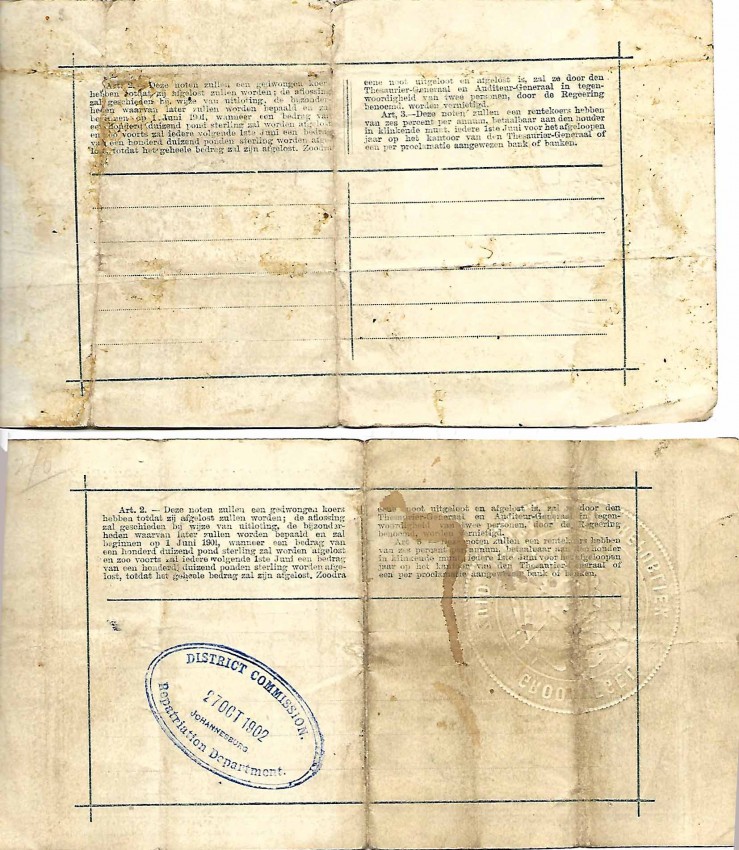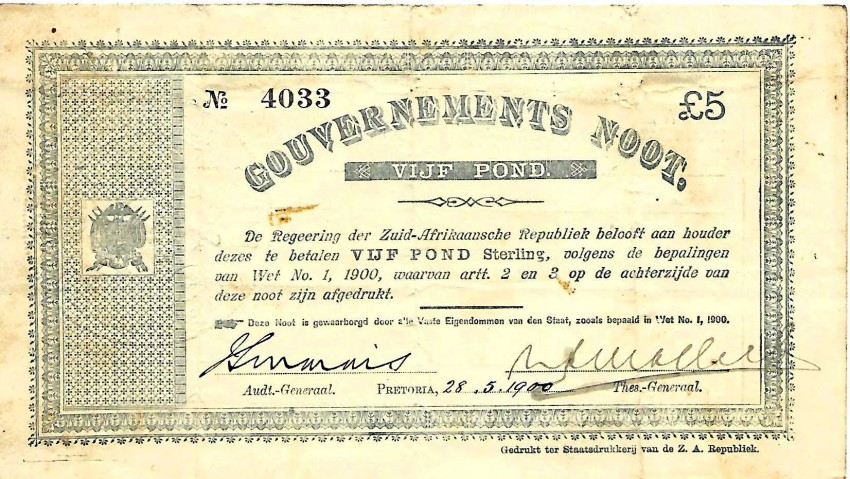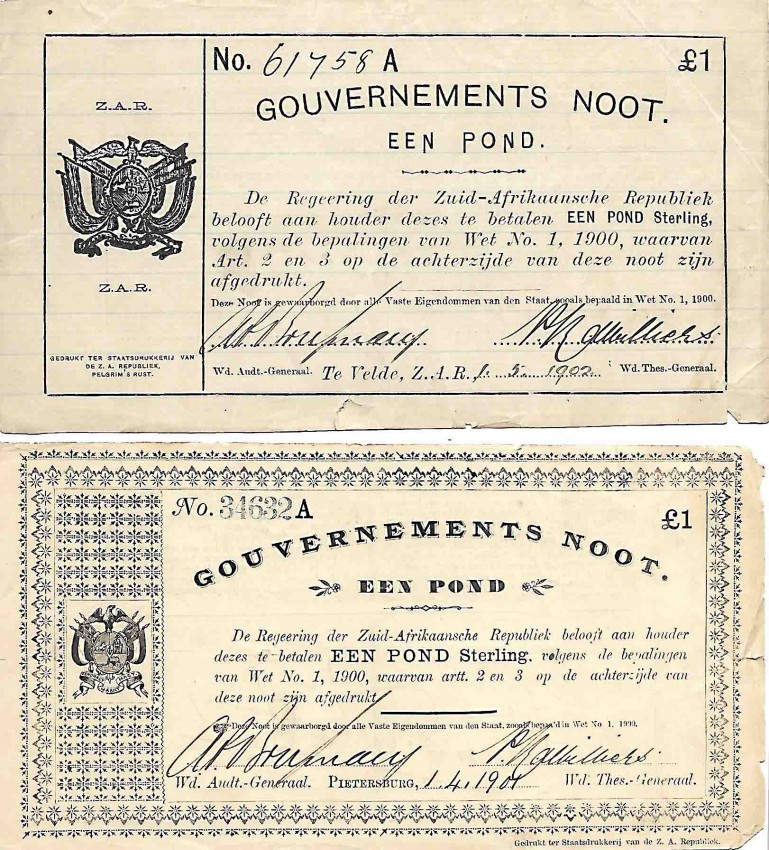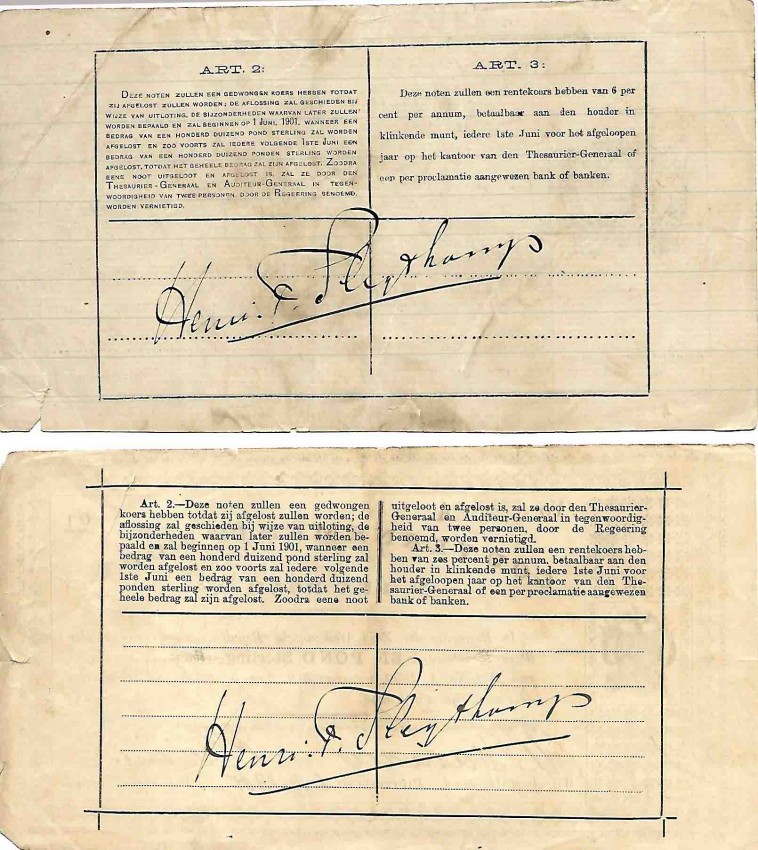Five original Z.A.R. Government Notes issued during the Boer War, comprising:
- Two first issue (Pretoria) 1 Pond notes, hand dated 28.5. 1900, hand signed by the Treasurer-General, N.S. Malherbe, and the Auditor-General, J.S. Marais.
- One first issue (Pretoria) 5 Pond note, hand dated 28.5.1900 and similarly signed as above.
- One Pietersburg Issue 1 Pond note, dated 1.4. 1901.
- One Te Velde Issue 1 Pond note, hand dated 1.5. 1902.
Condition: The three Pretoria issue notes have creases from folding and light staining but in good condition. The two later issue notes made of cheaper paper have not been folded but have some edge wear and tears.
The first banknotes issued by the ZAR Government during the Boer War were emergency notes issued in Pretoria were dated 28.5.1900 essentially for the payment of Boer Government officials and military supplies. They were issued At PRETORIA under ZAR Law No.1 which the British repudiated immediately (proclamation No.8) saying they would not be recognised except as evidence of war losses. The British later relented and honoured notes passed by the Central Judicial Commission. They did not circulate long in Pretoria. On 1 July 1900, Roberts announced that the British authorities declined to recognise the validity of these notes and declared them illegal. While these notes (and the later issues) were secured by all the fixed assets of the state at 6 per cent interest a year, most never redeemed, because the Republic lost the war. The notes were embossed with the great seal of the Zuid-Afrikaansche Republiek (ZAR). The notes were numbered and signed personally by the Treasurer-General, N.S. Malherbe, and the Auditor-General, J.S. Marais. The difference in the decorative motif is striking. The abbreviation "No." (for number) was omitted on the earlier notes. The notes were printed on white paper of good quality with a green tinge printing and were known as "green backs" as the general impression of their colour was green. The later series had a blackish over-all colour. These notes became known among the public as “blue backs”, possibly owing to the historical association with the previous green backs. The numbers of notes issues was quite small, for example, the highest number recorded on the £100 notes is 765 which indicates a probable total printing of only 800. These Pretoria issue notes are regarded as scarce.
After the British took Pretoria, the only free printing works was that of Zoutpansberg Wachter in Pietersburg. This was then declared the State Printing Works and adapted for the purpose of printing emergency bank notes. The paper on which these notes had been printed varied in thickness and the quality was generally much poorer than that of the Pretoria issue. Technical production was also inferior: the notes were not embossed, since the press had been too heavy to transport. The notes were signed by the Auditor-General, A.P. Brugman and the Treasurer-General, P.R. de Villiers. There were three separate issues dated 1 February, 1 March and 1 April 1901. When the British entered the Pietersburg district in March 1901, Vorster had to flee and leave his printing press behind. It was later blown up by the British.
After the British forces under Brigadier-General H.C.O. Plummer took Pietersburg on 8 April 1901, a printing press was found in Pilgrim's Rest and this is where the Te Velde notes were printed. This is where the last of the "blue backs" (this time in the field) were issued. The notes were dated 1 March, 1 April and 1 May 1902, and were in £1, £5 and £10 values. In circumstances such as these, some printer’s errors crept in.
At the surrender negotiations at Vereeniging on May 15 1902 Lord Kitchener and his team met with General J.C.Smuts (later to fight with great success for the British) and Generals C.R. de Wet, Louis Botha, and others. There it was agreed to redeem notes accepted as genuinely issued by the Central Judicial Commission, whose stamp would be applied to the notes if they met the terms of the ZAR Law No.1 and the holder had given due value for them. But no interest would be paid.
- Overall Condition: Good - Very Good
- Size: About 20x10cms.
- Sold By: Ronald Levine - Modern First Editions
- Contact Person: Ronald Levine
- Country: South Africa
- Email: [email protected]
- Telephone: 011643 8437
- Preferred Payment Methods: EFT for South African customers and International Bank Tranfer for customers abroad. I am unable to accept payment by credit card.
- Trade Associations: SABDA


